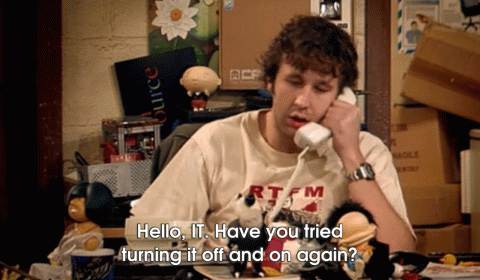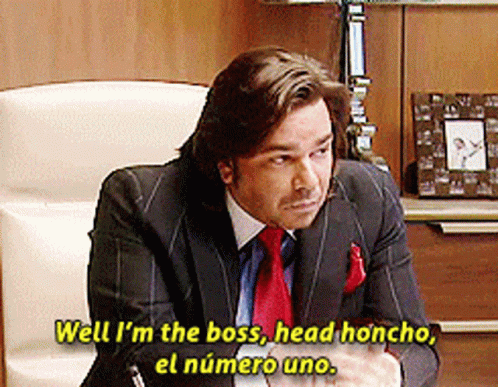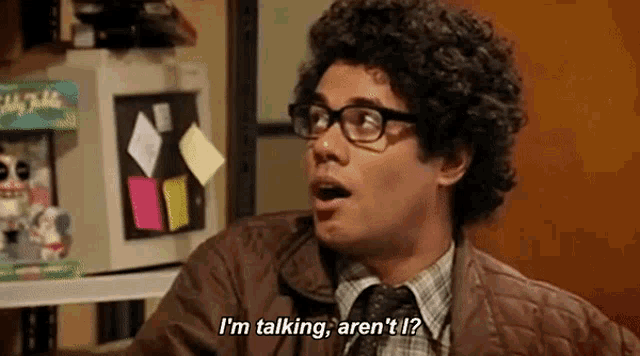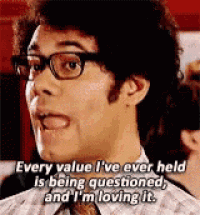5. Conflict

What?
The IT Crowd

The IT Crowd was a
hilarious
British sitcom (2006-2013) about the fictional Reynholm Industries in London, resolving around
the three
staff members
of its IT department: technical genius Maurice; work-shy Roy; and Jen, the department
head/relationship
manager who knows nothing about IT.
As a comedy show, it paints a very stereotypical picture: Roy and Moss are socially
inept geeks and despite the company's dependence on them, they are generally ignored and
considered losers
by the rest of the staff. Roy's support techniques include ignoring the phone, hoping it will
stop ringing,
and while Maurice is a brilliant technician, he is hopelessly clumsy and impossibly shy. It's up
to Jen, the
newest member, to bridge the gap between the technicians and the company's other employees, but
this
generally has the opposite effect, landing her and her teammates in ludicrous situations.
Fight or flight
As said, the IT Crowd offers a clichéd image of IT workers: while people in IT might be known
for their lack
of people skills, I would venture that many people struggle with interpersonal relationships at
work. After
all, we now know that we all suffer from fear of abandonement and fear of failure, and this
causes one of
two typical social responses. Either we avoid conflict as much as possible, or we get
self-defensive
quickly. It is either fight or flight — sound familiar?
Colleagues

If you don't recognize yourself in the above, let's look at it from another perspective. When
you ask people
about their work experience, they will often say that the work itself is great, but there is
this one
colleague or team leader who makes life hard. Either because they are regularly getting into
arguments with
this co-worker, or — more often with introverted people — because there is a
lingering conflict
between them but they avoid dealing with it at all cost.
I'm sure many IT people will identify more as conflict avoiders, as described above, than the
self-defensive
type. Still, I would invite you to take a hard look in the mirror and also explore the latter
side of your
character. Sure many people in IT are introverted and soft-spoken, but in a way (either subtle
or not so),
they can also, and I'm happy to include myself in this, be quite stubborn and argumentative.
Just look at
tech Twitter/X!
Meetings
A final example is meetings. Almost all developers I know will confess that they hate meetings.
But let's
look at what is really happening there. Some hate meetings because they fail to stand up for
their ideas.
Others because they are afraid to call bullshit on others' ideas. Still others because they
don't feel the
meeting is necessary, but still go to avoid making a fuss about it. All of these are strategies
to avoid
conflict...
Why?
Career
It goes without saying that failing to deal adequately with conflict, will cause stress and
unhappiness on
the work floor. What many people don't realize, though, is how determintal the inability to deal
with
conflict is to their career. In fact, in my opinion it is the main reason why people are stuck
in their
careers. Either they are too shy or too afraid to stand up to differing opinions and thus unable
to showcase
their true qualities and potential. Or, they are argumentative and contrary, so they are
considered "not a
team player" and thus miss out on opportunities to collaborate and grow.
Mastering conflict is therefore an essential part of any career, and not only for those who are
looking to
climb up the ladder. Sure, being able to deal with conflict is an essential part of leadership
skills, but
is also indispensable in a more subordinate role. Maintaining a healthy relationship with your
boss is as
much about conflict skills, as leading a team.
Work-life balance
Improving the way you handle conflict will also have a beneficial effect on your work-life
balance. This involves an important insight which we like to call the conditional vs
unconditional world.
You see, at first glance, the work environment is part of the conditional world: after all, work
essentially a situation where you perform actions because of a financial compensation. And your
friend and family are part of the unconditional world, where relationships are not defined by
certain conditions being met or not (so-called unconditional love).
However, with many people who are unhappy at their jobs you see a complete reversal of both
worlds. They work really hard, often going above and beyond expectations, and are absolutely
loyal to the team. But when their "unconditional" attitude is not met by their co-workers (who
do not work as hard as they do) or a team leader (who criticizes part of their work), they feel
betrayed and disrespected. Vice versa, when they come home, they are exhausted from work and
sometimes fall to conditional reasoning in the household: "Why am I always the one to load the
dishwasher?" and so on...
Being able to deal with conflict at the work place involves getting a better perspective on the
conditional and unconditional world. In my view: work is always conditional. Please, do the best
job you can, but never forget that work is "just" work. No one is irreplaceable. Friend and
family are always unconditional; and if they are not, perhaps it's time to questions some of
those relations...
How?
Clichés
When it comes to conflict skills, there are a lot of clichés going around. A nice example of
this is the response you get when asking LLMs about this, like Bing Chat. When asked about strategies for dealing with conflict, it
suggested things like
- open dialogue about personality and communication styles
- communication skills (e.g. active listening)
- conflict resolution strategies (e.g. compromise)
- emotional intelligence
All of these suggestions, however, have little merit in themselves. The real question is how do
you apply them?
Emotional intelligence
At least Bing got one thing right and that's pointing out the importance of emotional
intelligence, which it defines as "the ability to recognize and manage one’s own emotions, as
well as the emotions of others". But again, what does that mean?
Let's look at conflict from the now familiar perspective of our emotional systems. Avoiding
conflict is a manifestation of fear of abandonment above all. We fear our
colleagues' rejection or anger, so we choose to please them instead of confronting them. It is
important to realise that the opposite reaction, seeking out conflict, also stems from
the same fear of abandonment. It just uses a control mechanism ("I'll be the bully instead of
being bullied") instead of an avoidance mechanisme. Recognizing this dual response
(control/avoidance) to a negative emotion is a very common theme in emotional therapy.
Phone anxiety
Let's look at two concrete examples of this. One is so-called phone anxiety, an
increasingly common fear where people avoid conversations over the phone or (less often) are
afraid to answer the phone. Many Gen-Z people prefer texting over talking on the phone, and the reason is
clear. It is much "safer" to navigate a potential conflict (e.g. asking a question and getting a
no) in text than in a real-life conversation. This is classic fear of abandonment.
Public speaking

A very similar case is public speaking, which includes work presentations and more informal
speaking occasions, like stand-up meetings, which are popular in Scrum
environments. Being reluctant to talk in standup meetings or even just finding it hard to
articulate your views and react to those of others, is again textbook fear of abandonment.
Anger
By now, it's pretty obvious that learning to deal with conflict, means facing your fear of
abandonment, as it will help you stop avoiding conflict. However, it's also important to
acknowledge the role of anger, which accounts for stubborness and argumentative behaviour.
Failing to neutralize our anger also blocks our ability to acknowledge our mistakes (in a
subordinate role) or to refrain from punishing others' mistakes (in a leadership role). Letting
go of anger is therefore an important step towards ownership, maturity and accountability
— all of which are excellent levers to master conflict.
Identify triggers
In your journey towards eliminating fear and anger from your life, it will also serve you well
to
identify things, people, situations that are triggers for those emotional responses.
Specifically
for conflict, it's good to think about how your family handled conflict when you were growing up
and
how that has shaped your own conflict behaviour. Did your mom and dad avoid or seek out
conflict?
And in what domains or situations?
When it comes to fear and anger and the way they impact our behaviour, it is important to
realise
the role of so-called mirror
neurons in these emotional responses. A mirror neuron is a neuron that fires both when
an
organism acts and when the organism observes the same action performed by another. This is an
important mechanism of associative learning in mammals, which means that as children we "learn"
fear
and anger responses from our parents, siblings and peers. Couple that with our capacity for fear
memory (amygdala) and you realise it takes only a few iterations to deeply engrain fear in us. A
large aspect of emotional work
therefore
entails identifying our negative emotional "heritage" and reprogramming our emotional systems to
a
more positive disposition.
Change the world, start with yourself
We've already discussed the importance of others when it comes to conflict. I often see people
getting very frustrated at the fact that they have to deal with impossible colleagues or
management, both in a professional and personal context. And while they are right that the
person in question is posing outrageous behaviour, they forget that you cannot change
other people.
This is a really tough nut to crack, because secretely we all very much like trying to change
other people. Not because it is a fruitful endeavour, but because the alternative is a far
harder pill to swallow. The alternative is radical self-ownership: letting go of any resentment
and stubborness, and fully focussing on the one person we can change in this world: ourself.
This is why whenever I hear people say "That's just who I am", my skin starts to crawl. But I'll
freely admit: change is hard. We feel threatened by it ("Is this really for the better?"), we
feel self-pity ("Why do I have to change and not the other?") — which are all last-minute
attempts by our fear and anger centers to avoid facing them head on...
Challenge your beliefs

One final piece of advice concerning conflict handling, is to be open towards challenging your
so-called limiting beliefs. Every time you say "I do/don't", "I can't", "I am
(not)", "Others will", and so on, you are expressing a belief which constrains you in some way.
It prevents us from doing something or believing something else, and this inhibits us. This is a
control mechanism, and by now, we know that control mechanisms are rooted in fear.
Make love, not war
In conclusion, we now see clearly that this chapter on conflict is just a concrete manifestation
of the fear and anger we have already discussed in earlier chapters. To put it in Panksepp's
terms: the fear and anger associated with poor conflict handling at work, puts our emotional
experience in a state of war. It's high time to turn that around and strive towards a state of
play and care instead. Both leadership and teamwork can be excellent expressions of
this: leading a team with respect or working with others in the ful flow of creativity can lead
to true happiness and fulfilment on the work floor.
Are you ready to choose this above fear and anger?
Exercise
This week's exercise is simple, but not easy: write your own funeral eulogy. This
exercise has a double purpose: first of all, it will make you think about yourself from an
outside perspective. What kind of a person would people say you are/were? What would they say
were your biggest strengths and successes, and perhaps, your biggest failings and mistakes? What
kind of emotions does this stir up with you? Do you find yourself caring about what other people
will think of you when you die? Or does all this talk about you dying make you feel uneasy?
Good. This is true emotional work.
The second aspect of this exercise is that it will make you reflect on your core values, and
what they ultimately to you. How important are they to you and what joy have they brought to you
in life? Do you still stand by them? Of now that you know of your untimely demise would you
change them in any way?